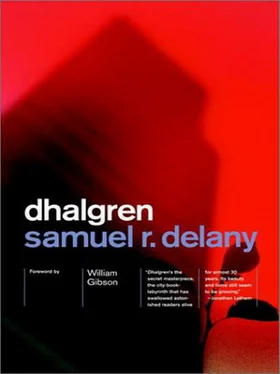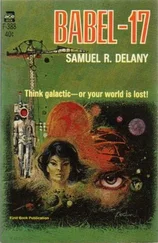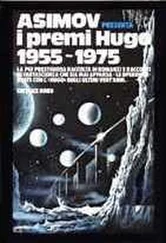The reason the bus driver hadn't wanted to go on was that Broadway grew ornate scrolled railings on either side and soared over traintracks forty feet down a brick-walled canyon. A few yards out, a twelve foot hunk of paving had fallen off, as though a gap-tooth giant had bitten it away. The railing twisted off both sides of the gash. From the edge, looking down, I couldn't see where any rubble had landed.
Beyond the overpass, to the left, a rusted wire fence ran before some trees; through the trees, I saw water patched with ash. To the right, up a slope blotched with grass, was the monastery.
Like that.
I walked up the steps between the beige stones. Halfway, I looked back across the road.
Smoke reeds grew from the woods and clotted waters to bloom and blend with the sky.
I reached the top of the steps with the strangest sense of relief and anticipation. The simple journey was the resolve that till now I'd thought suspended. The monastery was several three-story buildings. A tower rose behind the biggest. I put my hands in my pockets, feeling my leg muscles move as I walked; one finger went through a hole.
see, and the energy to build, some careful analog that completed the seeing.
They stuck at me for two weeks? For three?
I don't really know if they occurred. That would take another such burst. All I have been left is the exhausting habit of trying to tack up the slack in my life with words.
Thinking: You arrive at a monastery halfway through a round of pocket-pool. Sure. I relaxed my stomach (it had tightened in the climb) and ambled, breathing loudly, over the red and grey flags. Between dusty panes, putty blobbed the leaded tesselations. At the same moment I decided the place was deserted, a man in a hood and robe stepped around the corner and peered.
I took my hands out of my pockets.
He folded his over his lap and came forward. They were big, and translucent. The white-and-black toes of very old basketball sneakers poked alternately from his hem. His eyes were grey. His smile looked like the amphetamine freeze on a particularly pale airline stewardess. His hood was back enough to see his skull was white as bread dough. A sore, mostly hidden, like an eccentric map, was visible under the hood's edge: wet, raised, with purple bits crusted inside it and yellow flaking around it. "Yes," he asked. "Can I help you?"
I smiled and shrugged.
"I saw you coming up the steps and I was wondering if there was anything I could do for you, anyone in particular you wanted to see?"
"I was just looking around."
"Most of the grounds are in the back. We don't really encourage people to just wander about, unless they're staying. Frankly, they're not in such hot shape right through here. The Father was talking yesterday at the morning meal about starting a project to put them back in order. Everybody was delighted to get a place right across from Holland Lake—" He nodded toward the other side of the road. "But now look at it."
When I turned back from the lacustrine decay, he was pulling his hood further down his forehead with thick thumb and waxy forefinger.
I looked around at the buildings. I'd been trying to find this place so long; but once found, the search seemed so easy. I was off on some trip about—
"Excuse me," he said.
— and came back.
"Are you the Kid?"
I felt a good feeling in my stomach and a strong urge to say No. "Yeah."
His chin and his smile twisted in a giggle without sound. "I thought you might be. I don't know why I thought so, but it seemed a reasonable guess. I mean I've seen pictures of… scorpions — in the Times. So I knew you were one of them, but I had no way of knowing which one. That you were the…" and shook his head, a satisfied man. "Well." He folded his hands. "We've never been visited by any scorpions before, so I just took a guess." His wrinkleless face wrinkled. "Are you sure you weren't looking for someone?"
"Who's here to look for?"
"Most people who come usually want to see the Father — but he's closeted with Mr Calkins now, so that would be unfeasible today — unless of course you wanted to wait, or come back at some other—"
"Is Mr Calkins here?" In my head I'd been halfway through an imaginary dialogue which had begun when I'd answered his first question with: The Kid? Who, me? Naw…
"Yes."
"Could I see him?" I asked.
"Well, I don't… as I said, he's closeted with the Father."
"He'd want to see me," I said. "He's a friend of mine."
"I don't know if I ought to disturb them." His smile fixed some emotion I couldn't understand till he spoke: "And I believe one of the reasons Mr Calkins came here was to put some of his friends at a more comfortable distance." Then he giggled. Out loud.
"He's never met me," I said and wondered why. (To explain that the personal reasons which make you want to put friends at a distance had nothing to do with Calkins and me? But that's not what it sounded like.) I let it go.
A bell bonged.
"Oh, I guess—" he glanced at the tower—"Sister Ellen and Brother Paul didn't forget after all," and smiled (at some personal joke?) while I watched a model of the monastery I didn't even realize I'd made — the three buildings inhabited solely by the Father, Calkins, and this one here — break down and reassemble into: a community of brothers and sisters, a small garden, goats and chickens, matins, complines, vespers…
"Hey," I said.
He looked at me.
"You go tell Mr Calkins the Kid is here, and find out if he wants to see me. If he doesn't, I'll come back some other time — now that I know where this place is."
He considered, unhappily. "Well, all right." He turned.
"Hey."
He looked back.
"Who are you?"
"Randy… eh, Brother Randolf."
"Okay."
He went off around the corner, with the echo of the bell.
Beneath the chipped keystone the arched door looked as though (a slough of rust below the wrist-thick bolt) it hadn't been opened all year.
And I got back on my trip: I had looked so long for this place; finding it had been accomplished with no care for the goal itself. For minutes I wondered if I couldn't get everything in my life like that. When I finally worked out a sane answer ("No."), I laughed (aloud) and felt better.
"They're all—"
I turned from the miasmas of Holland Lake.
"— all finished for the afternoon," Brother Randy said from the corner. "He'll talk with you. Mr Calkins said he'll talk with you a little while. The Father says it's all right." (I started toward him and he still said:) "You just come with me." I think he was surprised it had worked out like that. I was surprised too; but he was unhappy about it.
"Here" was a white wood lawn chair on a stone porch with columns, along the side of the building.
I sat and gave him a grin.
"They're finished, you see," he offered. "For the afternoon. And the Father says it's all right for him to talk now, if it isn't for too long."
I think he wanted to smile.
I wonder if that thing up under his hood hurt.
"Thanks," I said.
He left.
I looked around the patchy grass, up and down the porch, at the beige stone; inset beside me in the wall was a concrete grill, cast in floral curls. Once I stood up and looked through it close. Another grill behind it was set six inches out of alignment, so you couldn't see inside. I was thinking it was probably for ventilation, when my knee (as I moved across the stone flowers trying to see) hit the chair and the feet scraped, loudly.
"Excuse me …?"
I pulled back a few inches. "Hello?" I said, surprised.
"I didn't realize you were out there yet — until I heard you move."
Читать дальше












